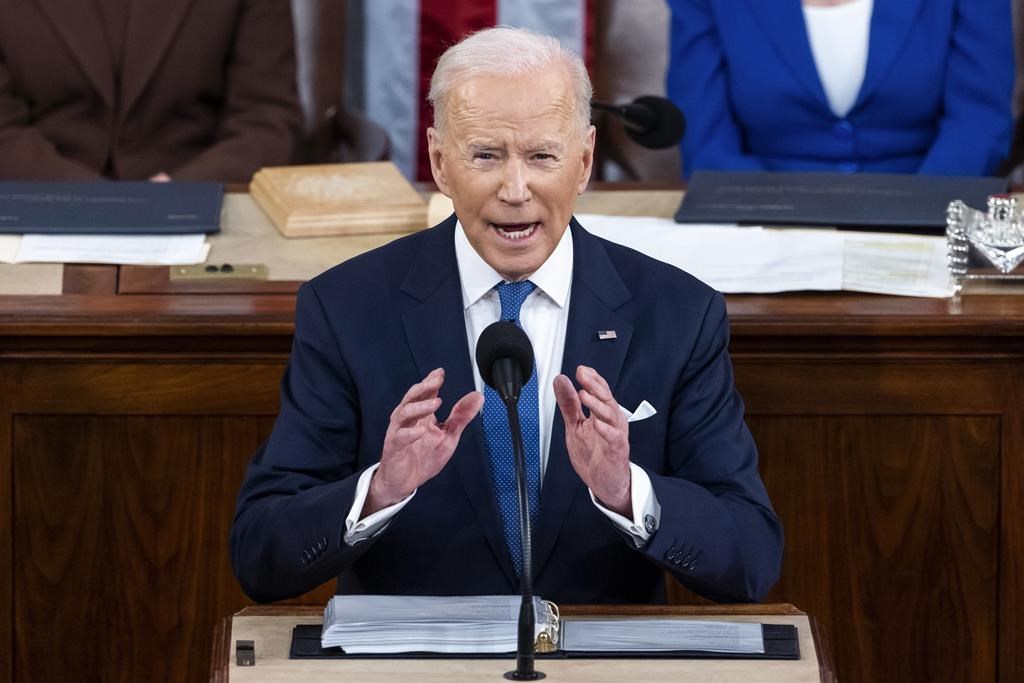at the 2021 State of the Union Address.
WASHINGTON — U.S. President Joe Biden on Tuesday made no apologies for his wasteful, pro-US economic strategy and made it clear in his second State of the Union address that he intends to stick to a protectionist approach, which could hurt worried allies, including Canada cares.
Biden, with newly elected House Speaker Kevin McCarthy over his shoulder, preached the benefits of working across the aisle as he addressed a newly divided Congress after Republicans wrested control of the House from Democrats in November.
With some Republicans poised for a fight amid the looming presidential election, Biden is under pressure to justify what political opponents call a wasteful approach to the federal coffers, making it all the more important to ensure the money stays on US soil.
And he wasn’t just defending Buy American. He doubled it and promised new rules for federal infrastructure projects that would require all building materials — not just iron and steel, but copper, aluminum, wood, glass, drywall and fiber-optic cable — to be made in the United States
“Under my supervision, American roads, American bridges and American highways will be built with American products,” Biden said.
“My business plan is to invest in places and people that have been forgotten. You might see this at home. You remember the lost jobs. And you’re wondering if there’s even any way you and your kids can move forward without moving away.”
Protectionism notwithstanding, most Canadians still see the US as their country’s closest ally, a new poll shows – but they seem less certain that their powerful neighbor is a force for good in the world.
Almost 70 percent of respondents to the online poll conducted by Leger for the Association for Canadian Studies said they still see the US as Canada’s best friend, while 16 percent said they disagreed and 15 percent said they knew not.
However, respondents were far more divided on whether the US has a positive impact on international affairs: 41 percent disagreed, compared to 38 percent who said they believed it did. Twenty-one percent abstained.
Part of this is likely due to the over-partisanship that drives U.S. politics, evident when Biden turned to domestic issues such as drug costs, oil and gas production, corporate tax hikes and the ever-present debt ceiling controversy.
McCarthy has insisted Republicans will not vote to raise the debt ceiling, a necessary step to prevent the US from defaulting without an agreement to cut spending to 2022 levels, equivalent to a cut of corresponds to about eight percent.
Biden said Republicans are proposing deep cuts to cherished programs like Social Security and Medicare, a claim that led to eye-rolls from McCarthy and whistles and boos from Georgia’s Marjorie Taylor Greene and Colorado’s Lauren Boebert, among others.
“Let us confess here tonight that the full confidence and credit of the United States of America will never be called into question,” he said, before accusing certain Republicans of trying to “hold the economy hostage.”
“I’m not saying it’s a majority of you … but it’s being suggested by some of you,” Biden told his critics as he expressed their contempt, which he took as evidence they supported his position.
“So it seems we can all agree: Social Security and Medicare are off the books now, right? All right, we have unanimity.”
He announced ambitious efforts to stem the flow of deadly drugs like fentanyl into the country, redouble the search for a cure for cancer and alleviate its causes, better support veterans at risk of suicide and tackle the mental health crisis.
Biden reiterated his call for a ban on assault weapons and cheered for Brandon Tsay, the 26-year-old California man who disarmed the gunman who killed 11 at a Monterey Park dance studio last month.
And he celebrated Ukraine’s resistance in the face of Russian aggression, as well as the American show of unity, solidarity and leadership that helped bring it about.
With all eyes returning to the upcoming White House race, Biden’s protectionist rhetoric is likely aimed primarily at winning over a domestic political audience, and most observers agree that the US is targeting Beijing, not Canada have.
And with the country in turmoil over a weather balloon that Chinese officials said drifted through Canadian and US airspace last week and was shot down by US jet fighters over the weekend, the president has every reason to advocate economic decoupling from China .
But it would be a mistake to assume that the US will automatically turn to Canada for its energy, raw materials and manufactured goods, said Flavio Volpe, president of the Canadian Association of Auto Parts Manufacturers.
“Canada will do well not to assume we’re in the tent. We will have to prove and blame ourselves on many points that we take for granted,” said Volpe.
“Look for a transactional language to dominate our relationship rather than an ideology. Shared values are important, but sharing values is more important.”
Despite what the president may say publicly, however, the US understands how important Canada is to its own economic fortune, said Innovation Secretary Francois-Philippe Champagne, who will be in Washington later this week with Defense Secretary Anita Anand.
“I think it’s well understood…that Canada has to be part of the equation for the United States to be resilient,” Champagne said in an interview.
“We have a lot of opportunities ahead of us. And for me the big question is how can we innovate more together, how can we do more together and how can we sell more to the rest of the world together.”
Before Tuesday, Biden had left the “inside focus” that marked the first two years of his presidency, said Louise Blais, a retired Canadian envoy who now serves as a senior adviser to the Business Council of Canada and a diplomat in Canada. Stay at Laval University in Quebec.
“As of this year, actually, the narrative that he uses when he addresses the issues surrounding economic security and supply chains has really changed,” Blais said in a pre-speech interview.
“After two tough years … we’re now starting to see a different approach — at least rhetorically. He speaks about the importance of working with America’s continental allies.”
This report from The Canadian Press was first published on February 7, 2023.
James McCarten, The Canadian Press
Don’t miss interesting posts on Famousbio










